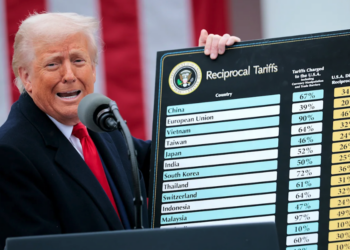Nigerian crude remained steady at $73 after a three-day decline, as concerns grew over Russian supply risks, further intensified by US President Donald Trump’s escalating threats to penalize India for purchasing crude from Moscow.
Brent fell below $69 a barrel after losing over 6% in the past three sessions, while West Texas Intermediate hovered near $66 a barrel.
U.S President’s comments about “substantially raising” tariffs on exported Indian goods due to Russian oil imports were an attempt to pressure Moscow into complying with a ceasefire concerning the Ukraine conflict, which drew strong opposition from New Delhi.
The US president issued his most recent warning to India just before his deadline of August 8 for Russia to agree to a truce with Ukraine.
Tass stated that Steve Witkoff, the US Special Envoy, is scheduled to travel to Moscow on Wednesday. After Russia’s invasion of Ukraine in 2022, India became the largest purchaser of Russian seaborne crude exports, quickly increasing purchases from nearly zero to roughly one-third of imports while snatching up discounted barrels avoided by Western countries. China is a significant buyer of oil from Moscow as well.
India’s ongoing demand for oil keeps Nigerian barrels in high demand, highlighting the impact of global supply chain shifts and new consumption patterns.
Nigeria’s crude oil production increases
The narrowing delta between Brent and Nigerian crude is a sign of increased market competition. A statement released on Monday by Nigeria’s upstream regulator stated that the country’s oil production averaged 1.8 million barrels per day.
Nigeria relies on increased crude oil production to finance its economy; the black viscous hydrocarbon constitutes over 80% of foreign exchange earnings and nearly two-thirds of government revenue.
Gbenga Komolafe of the Nigerian Upstream Petroleum Regulatory Commission said the output rise is from enhanced security measures and is part of an effort to boost oil production from 1 million to 3 million barrels per day.
Nigeria aims to increase its oil output, with a medium-term target of reaching 2.06 million barrels per day by 2027, according to Bayo Ojulari, CEO of the Nigerian National Petroleum Company (NNPC) Limited. He expressed confidence that by December this year, output could reach 1.9 million barrels per day.
Nigeria achieved full operational capacity on its major crude oil pipelines in June, a milestone Ojulari said was the first in many years and signaled improved system reliability and infrastructure security.
OPEC+ members to increase crude oil output
OPEC+ members’ decision to boost crude output at the start of the next month stems from the ongoing recovery of the global economy and fundamental market factors. Data from the August 3 meeting, which involved Saudi Arabia, Russia, Iraq, the UAE, Kuwait, Kazakhstan, Algeria, and Oman, showed they reaffirmed their commitment not to destabilize the market.
The phased responsive increase marks the fourth monthly hike in the 2.2 million bpd voluntary production cuts introduced in April and November 2023 in a bid to support prices during highly volatile market conditions.
OPEC explicitly supported the participants and quoted, “By the decision agreed upon on 5 December 2024 to start a gradual and flexible return of the 2.2 million barrels per day voluntary adjustments starting from1 April 2025, the eight participating countries will implement a production adjustment of 547 thousand barrels per day in September 2025 from the August 2025 required production level.
” However, industry analysts are increasingly worried that this decision could put downward pressure on oil prices, which would negatively affect Nigeria’s oil revenues.
“Although there is a lot of discussion about tariffs on India, it is clear that there is a possibility that secondary tariffs will also be applied to other buyers,” said Patterson of ING. The more buyers are subject to these tariffs, the more difficult it is for the market to cope with the potential disruption.
If India’s purchases of Russian oil are interrupted, it might have to look for supplies elsewhere. Other OPEC+ countries, those in the Middle East, were able to make up for any potential shortfall, according to a recent note from Rystad Energy. The alliance agreed to start increasing production in September by about 547,000 barrels per day.
























